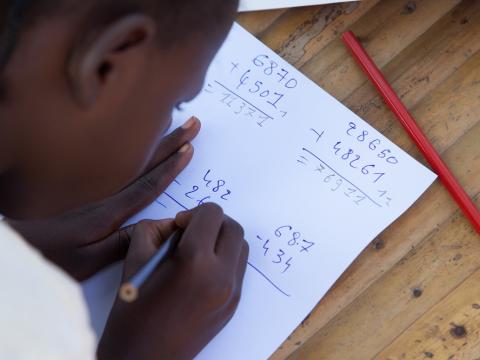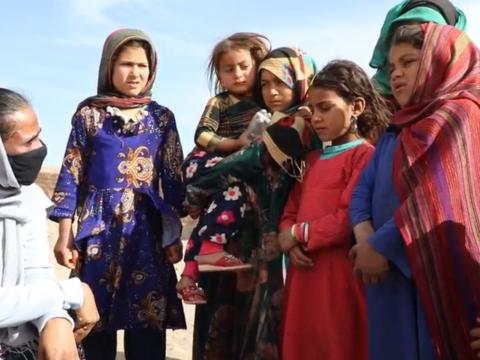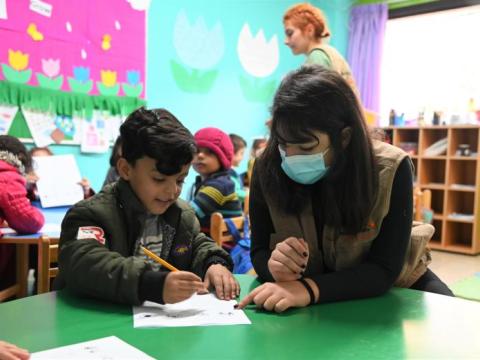
Getting back to school takes a village
Kerin says that parents and carers are crucial to helping children catch up on education after COVID-19 shut down schools worldwide.
By Kerin Ord, Global Sector Lead for Education
20 January, 2022
If there is one thing that COVID-related school closures have done, it is to highlight the important role that teachers play in children’s development. As schools around the world re-open their doors to students (Uganda for example only recently re-opening schools, shuttered since March 2020), the impact of the closures is becoming apparent. Loss of learning, academic and socio-emotional, could have a catastrophic impact on advances made in education over the past two decades. Global efforts are being called for to ensure all children return to school, and that teachers are better prepared and supported to address learning losses among their students. Incorporating digital technology into their teaching is also a priority.
Alongside these calls to support the education system, I am encouraged to see various studies and recommendations calling for greater support for parent, family and community engagement. Parents and communities are being recognised as key, necessary stakeholders in the education system. This has not always been the case and I have many times had to argue in support of the ‘community bit’ of a large education grant, when donors required budget cuts.
If you think about it, parents are a child’s first teacher, and the range of people and situations from whom and in which children learn increases as the child grows. Indeed, a child spends only between 10 – 20 percent of their waking hours at school.
However, as children move into school, parents allow the school to take on a major part of their formal education. Studies have shown that this is more prevalent among parents of lower educational and socio-economic backgrounds where the lack of resources and/or confidence to support a child’s education can impede parental engagement. One comment made by a Nigerian parent was: “I can’t support my child’s learning because I am not a teacher.” The impact this inequity has had on the level of learning lost by children during the pandemic is stark.
Thankfully, there are many approaches to overcoming this lack of out-of-school support for children’s learning. Some of the strategies to facilitate greater parental and community engagement with children’s school include:
Strengthening parental confidence. Parents and caregivers, particularly those with low levels of formal education and household resources, can learn strategies to provide a safe and stimulating learning environment in the home. World Vision’s Go Baby Go model is a parenting programme that aims to strengthen caregiver competence and confidence to provide nurturing care in her/his first 1000 days. Pilot testing showed that, when integrated with maternal and newborn child health (MNCH) interventions, this project model significantly improved children’s developmental outcomes, especially those from the most vulnerable communities, compared to control groups that only received MCNH. World Vision has recognised that we need to improve the impact of our programmes on improving the home literacy environment and are therefore embedding behaviour-change practices in our approach to working with parents - identifying the barriers to their involvement and providing strategies to support learning at home. This support at the household level was particularly important in building the confidence of parents with low literacy/education levels.
Strengthen community support. The wider community can also provide opportunities for children to learn and support parents in their efforts to do the same – particularly for the most vulnerable households. For example, preliminary results from our work with Syrian refugees in Jordan show that parents of children with disabilities are almost three times as likely to send these children to school if they (the parents) are in support groups with other parents whose children have disabilities. World Vision’s early grade award-winning reading programme, Unlock Literacy, helps communities to set up Reading Clubs and trains community volunteers to facilitate playful, fun literacy activities. Throughout COVID-related school shut downs, World Vision used these Reading Clubs as a platform through which to distribute at-home learning materials, or to encourage participation in distance learning efforts provided by the Ministry of Education. In Fanteakwa, Ghana, World Vision set up 33 Reading Clubs in 21 communities allowing children to borrow books to read. During school closures, the project distributed over 16,000 storybooks, 140 different titles, which were borrowed by over 1200 children every week. We are currently working with members of the Accelerated Education Working Group to further develop and test guidance for communities on providing and/or supporting catch up learning efforts to assist children’s transition back to school.
Facilitate greater engagement between caregivers, community and school. Schools in many countries have long provided opportunities for parents to meet with teachers to discuss a child’s performance. COVID-related school closures necessitated perhaps a greater engagement between teachers/schools and families than in the past to find ways of engaging with parents to help their children learn at home. However, greater parental and community involvement in forming a new vision for the future of education is called for in both the Brookings Institution’s Family School Engagement Playbook and UNESCO’s Reimaging Our Futures Together: a new social contract for education. Research conducted with schools in World Vision’s programmes in Uganda showed that community monitoring improves test scores and pupil and teacher attendance at low cost, but only when communities can choose the criteria by which they judge school performance.
To truly transform education, to ensure it is sufficiently agile to cope with rapid change brought about by current or future global pandemics, or climate-change-related disasters, or conflict, we cannot think of or treat education as a closed system. We need to foster a variety of opportunities, platforms and skills to enable parents and teachers to engage effectively and respectfully in ways that accelerate and strengthen shared goals for our children.
Learn more about World Vision's Education programming here
Kerin Ord has been Global Sector Lead for Education at World Vision International since 2017, leading efforts to ensure all children in our education programmes experience nurturing care and have timely, quality, inclusive learning opportunities in their homes, communities and schools.

